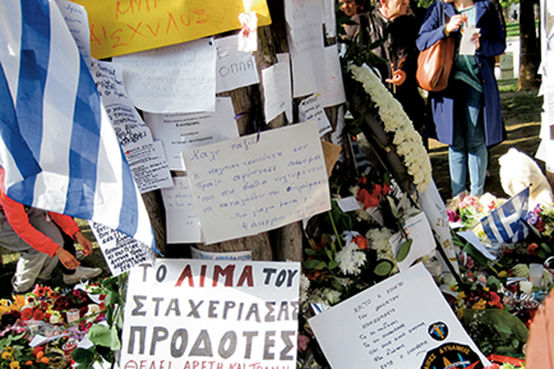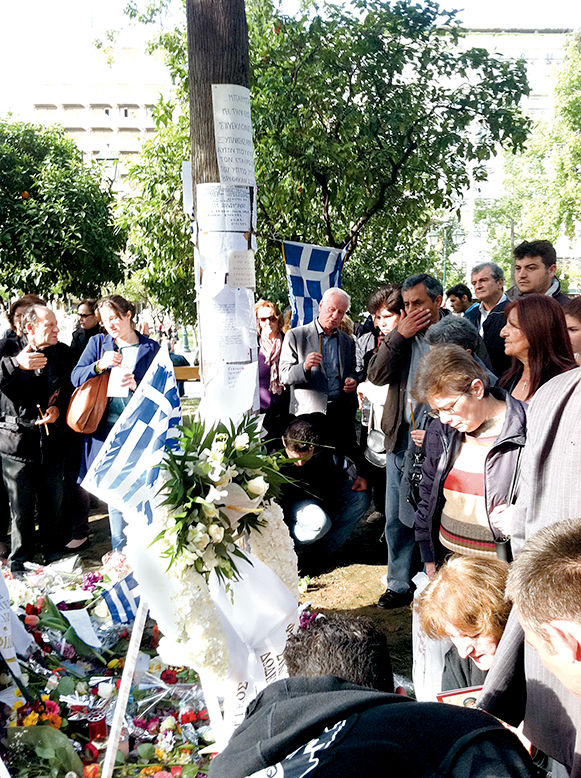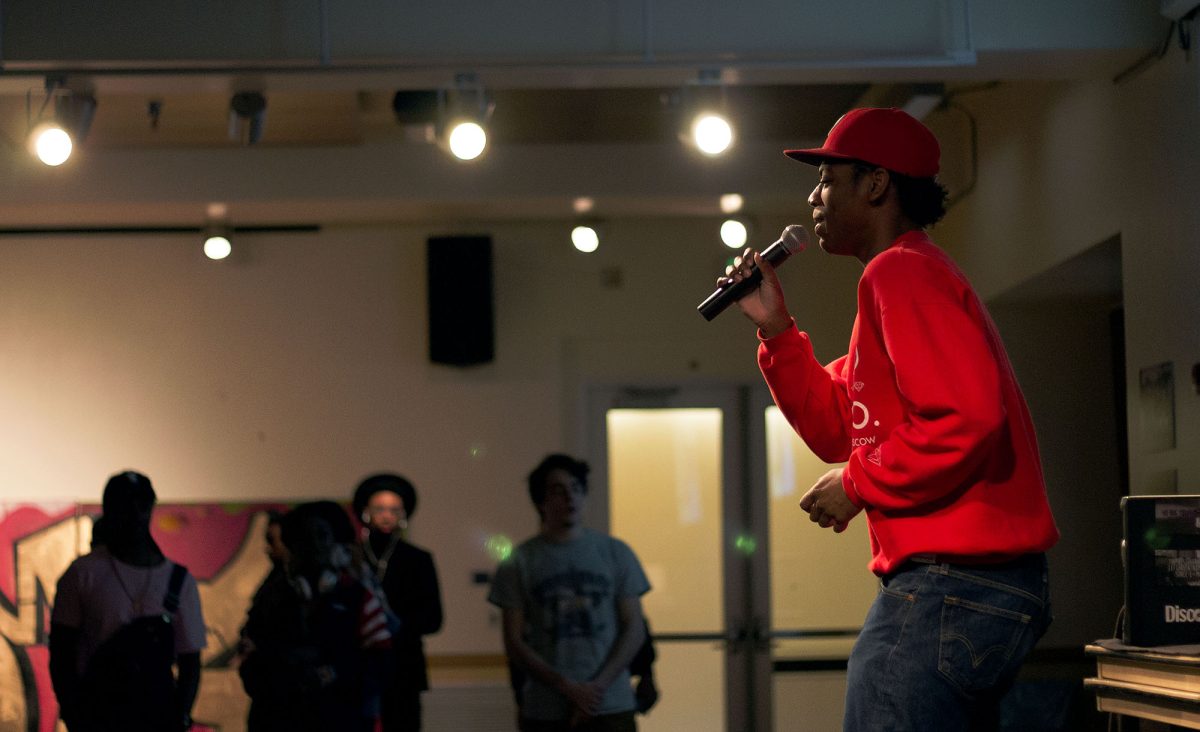Story and Photos by Brenna Houck
Sun streamed through the green branches overhead, spreading patches of dappled light across the trunk of a ragged pine tree in the southeast corner of Syntagma Square. Although the afternoon was bright, the tone in the square was notably dark. The tree’s bark was thickly covered with handwritten memorials to Dimitris Christoulas, the retired Greek pharmacist who had taken his life on this spot the day before. One white wreath stood propped beneath its shady branches, a tribute left by the Attica Pharmacists’ Association. An Orthodox Catholic priest stood off to the side, long burgundy robes flowing as he spoke sternly to the crowd. The priest may have been calling out a political message, but to me the words were incomprehensibly foreign. People took turns pushing toward the tree with small tokens in hand—a lit candle, a saint’s image, a small letter with a message scrawled in Greek characters.
Only 11 days had passed since I arrived in Athens to study archeology for three months, yet here I was, at a vigil for a man whose suicide had become a symbol of protest against the Greek austerity measures that had destroyed his pension. In the hours and days following his death, 77-year-old Christoulas had become a worldwide news story, and for some Greeks, an icon of the resistance movement that blossomed out of the country’s economic and political uncertainty.
Christoulas’s suicide note doubled as a political statement that equated the politicians involved in Greece’s economic crisis with those of the puppet government put in place by the Nazis in the 1940s. The occupation had resulted in the starvation of nearly 300,000 Greeks. Too old to return to work and too desperate to live, Christoulas made the only statement in his power: turning a gun on himself beneath this tree.
On a normal day, the Syntagma Square acts as a thruway for multitudes of tourists and shoppers on their way to the National Gardens, the subway, or the popular Ermou and Monastiraki shopping districts. However, this evening the atmosphere felt tense as people milled about without a destination. The square, which is located in the center of Athens, lies in stark contrast to the country’s parliament building across the street and the location serves as the primary stage for political demonstrations.
I bent down to place a single red carnation near the lit candles at the tree’s base. I felt a bit like a fraud among the mourners who knelt by the tree reciting prayers. I knew very little beyond what my art professor in Athens told me about Christoulas, but when she extended an invitation to the vigil, I decided to tag along out of journalistic curiosity. The red carnation, she explained, symbolized the Greek working-class resistance movement Christoulas hoped to inspire with his sacrifice. Only a few hours before, his red blood had coated the grass beneath this tree; any that remained was now covered with candles and flowers.
I was aware of the economic problems in Greece—it was a topic almost everyone wanted to talk about when I mentioned I was studying abroad in the financially troubled country. The global recession that has shaken many of the world’s economies in recent years, revealed a severely weakened Greek economy with a staggering debt ratio that threatens the stability of the European Union. For this reason, Greeks are caught in the middle of an international debate amidst rising homelessness and suicide rates, increasingly divisive political extremism, and unemployment facing more than half the country’s youth. While the tumult in Athens has calmed since riots and protests began feeding foreign headlines last fall, the desperation continues to grow.
It’s an extremely complex issue with no simple answers. Yet standing among the Athenians, it was as if—for that moment—all the political and economic strife faded into the background and what was left was the humanity of this sad situation. Christoulas’s death reminded me that when economic crises occur it’s not just the bankers or nations that lose. While officials around the world grapple with how to minimize debt or ease Greece’s exit from the euro zone, real people like those surrounding me in the square are facing life-altering, tragic choices.
The outpouring of emotion at the memorial allowed me to transcend the language barrier and I was able to empathize with these strangers. Though I couldn’t read the hand-written messages or comprehend the priest’s words, I could see and feel the despair of those around me. Standing within the crowd, I could understand how they identified with this man, and how frustrating it must be to feel you have no way out of a terrible situation.
Raw and exposed, these Athenians had gathered to pray for a man and the cause he stood for. After taking in the scene, I said a silent contemplative prayer with them. Although I initially felt out of place among the Athenians at the memorial, in that moment I was no longer alien in their midst.
Categories:
Vigil at Syntagma Square
September 24, 2012

0
Donate to Ethos
Your donation will support the student journalists of University of Oregon - Ethos. Your contribution will allow us to purchase equipment and cover our annual website hosting costs.
More to Discover














